Friday, 27 September 2024

As almost all West-German small towns with an intact historic centre Witzenhausen has both, a health food shop in the tradition of the Lebensreform movement at the beginning of the 20th century (the
Reformhaus "Schön und gesund"), and
a Weltladen fair-trade shop driven by volunteers.

But there's also a traditional organic corner shop offering all you need for food, household, hygiene and recreational treats: the
Schachtelhalm (German for "horsetail", the plant). Unfortunately I arrived too late a Saturday to catch more than a glimpse from the outside.
The local brewery, Schinkel, a start-up of the university milieu, was Hesse's first organic brewery, but to date only a few of their beers are certified organic. You can get (and taste) them at the brewery's own salespoint,
Schinkels Biershop.
Unterrieden
If you come to Witzenhausen on the Werratalradweg from Bad Sooden-Allendorf the bicycle route is running through the village Unterrieden, a part of Witzenhausen on the Eastern side of the river Werra right before the river turns to the West. On the main road through Unterrieden, the Ludwigsteinstraße, you'll find no less than three farm shops, described here from South to North.

The farm shop of the
Absatzgenossenschaft Unterrieden (AGU), a co-operative of both, organic and conventional farms in the village famous for its cherries, offers a wide range of locally produced food and beverages: fresh greens, sausages, cheese, bread, honey, preserves, fruit juices, wines and spirits. Only a fraction of it is organically certified, and unfortunately you cannot tell how much inorganic fertilisers and poisonous pest control has been used to produce products missing a certificate. When I asked about bread and rolls the shop keeper told me that the bakery had been organic in the past, but since the baker retired the products have been coming from the only remaining artisanal bakery in town. Some of the (fruit) wines and honey definitely sport the European organic label.
The AGU shop also stocks organic jams and spreads of
Knofi & so ("garlic and such") in very small glasses, perfect as a small gift. The label belongs to a community of passionate market gardeners with a focus on direct trade. They are operating a small manufactory and market boothes. The one in Ludwigsteinstraße is unmanned, with an honesty box to put your money in. When I was there in August there were lovely tomatoes, but when I returned in September the booth was temporarily put down, so I suspect it is there only when excess greens are available. The "Knofis" also offer basic guest rooms for cyclists and backpackers.
Poultry lovers must not miss the poultry butcher's shop
Frischgeflügel Roth. Unfortunately the shop is open only two days a week and was on vacation when I was there, so the vending machine in front of the shop was empty, too. The butcher co-operates with almost all organic poultry farms in the region.
2024-09-27 16:00:00
[Witzenhausen, Werratalradweg, organic, fair, coffee, supermarkets, grocery, accommodation, breweries, butcher, farms]
[direct link · table of contents]

Thursday, 26 September 2024
While thriving during the covid-19 pandemics, package-free supermarkets have been facing hard times thereafter, and in big cities with high rents we've seen a wave of shop closings.
Even the beautiful grocery Wunderbar unverpackt ("Wonderfully devoid of packaging") which opened in May 2018 wasn't able to survive and closed for good in 2023.

To refill dry food supplies from gravity bins pay a visit to the Naturalia grocery at Wöhlerplatz, a traditional crammed organic corner shop which offers a small assortment of dry food (pasta, cereals, nuts, rice and the like) in self-service dispensers. Apart from this eggs, bakery items, fruits, veges and cheese can be taken home in your own jars and bags. In addition the place is also a tea shop – so bring your tea boxes for refill. If you stay in town for a longer period of time consider to collect stamps on the Göttingen Climate Card ("Klima-Karte") here each time you use your own bag or box. When you collect 16 stamps from a number of (not necessarily organic) shops, market boothes and restaurants in town you will be rewarded with a climate-positive goodie bag and earn support for climate projects in town.
The shop-keeper seems to run a small farm herself as she asks for apologies in case she'd appear in the shop past 10 am, to help sheep giving birth.

The second organic grocery to collect Climate Card stamps from is the Bioladen an der Burgstraße, a dedicated anti-fascist neighbourhood grocery next to Cafe Inti. A few years ago this cosy full-retailer replaced a
branch of an organic bakery based in Klein Lengden with shops both there and in Göttingen, delivering to many organic markets in the greater region. The Sunday-open place has the air of a traditional organic corner shop and makes an extra effort to offer products packaged in returnable glasses, among others wine gums. More liquorice and jellies can be bought by the piece, and together with the cheese and bakery counter (which fills about half of the entire location), the racks with fruit and veges and the dairy products and drinks in deposit glasses and bottles my estimate is that more than half of the goods can be bought without disposable packaging. You can fetch a coffee in your own mug or a deposit cup.
The shop also has an innovative approach to keep away wasps from ripe fruits: small trays filled with over-ripe fruit juice on a window sill a little apart from the entrance attract the insects which are occupied there as long as you don't disturb them.
The second and much larger organic supermarket in the inner city belongs to the
Alnatura chain. Although it doesn't have an explicit focus on zero waste the staff at the bakery cum cheese counter is happy when you come with your own boxes and bags, and there's a good selection of products in deposit glasses and bottles. There are no cafe tables and chairs, but you can take out coffee drinks and tea (in deposit mugs) and choose from a great selection of sandwiches. Even in the evening hours you will usually still find a sandwich.
Geismar and Diemarden
The Gemüseladen in the Western suburb of Geismar, near the church of St. Martin, is not participating in the Klima-Karte scheme. However, this organic greengrocery is offering an abundance of regional produce which you can take home in your own bags.
On the other side of the street you'll find
Le Bol, a bio-dynamic organic French-German artisanal sourdough bakery – according to locals making the best bread in town. Needless to say that you can come with your own bag and that the bread keeps fresh much longer than ordinary fare. Given that the baker has to rise early so you can have fresh bread in the morning, opening hours are restricted to the morning ihours except on Thursdays.
If you are on a bike tour or stay in town a little longer consider a visit to the
Naturmilchhof Gartetal organic dairy farm. To get their continue from Geismar to the village of Diemarden about four to five kilometres away. Buying fresh milk, oat drink, yogurt, kefir or cheeses from the farm's own dairy is unfortunately somewhat inconvenient as you must register at the farm's web shop to use their self-service farmshop guarded by surveillance cameras. Then you would use the computer inside the shop to register your purchase, and your debt will be detracted from your bank account. I haven't checked whether this works with any European bank account. All liquid and semi-liquid products come in returnable plastic bottles and jars with a deposit. The shop is closed on Sundays and public holidays.
Non-food
Household items supporting a package-free lifestyle can be found at the factory outlet of the eco postal order shop Waschbär near Geismartor. Here you may also refill cleaning agents, liquid soap and detergents to get a stamp on your Climate Card. Unfortunately the shop is going to close for good by the end of October, 2024.
Tea
In the 1990ies owner-driven tea shops offering a great selection of loose-weight teas, herbal and fruit blends were quite a thing, and fortunately they have been surviving in Göttingen so far. With the years, their assortment of organic teas has increased, and I haven't found one who refused to fill my tea boxes (even though you may ask for it verbosely).

The
Teehaus Kluntje isn't just a nice shop for teas and everything you need for tea ceremonies or small recreational everyday tea breaks, it also serves you a good cup of tea. However, it's a bit too focused on being a gift shop if you prefer tea shops with a reduced atmosphere.
Personally I prefer the wooden interior
of Teehaus Schmidt
which nicely brings out the timber frames of the old house. Here the focus is clearly on tea and spices. An interesting fact: The place was a students' start-up in the 1970ies.
In a city with as many tea lovers you won't be surprised to find a branch of the
Tee Gschwendner franchise. Just like other franchises of this brand they sell more conventional than organic teas, but the shop assistants will show the right types when you ask for "bee-o" (bio) teas and place your tea box on the till.
Fortunately Göttingen still has many cosy carefully curated owner-driven shops. When I tried to visit the traditional confectioners' shop cum delicatessen
Alfred Ewert on recommendation by locals it was too late to find it open, and the products on display in the shop's windows weren't organic. So I decided not to list it here. However, pink@norden.social recommended it as a veritable loose tea shop, so I suggest that you pay a visit and check for organic labels and the "bio" keyword.
Closed
2024-09-26 13:30:00
[Goettingen, Geismar, organic, vegetarian, zero_waste, unverpackt, grocery, supermarkets, bodycare, household, tea, bakeries, sunday_open, farms]
[direct link · table of contents]

Monday, 23 September 2024
Both touristically attractive historic towns have direct hourly local train connections with each other and to Göttingen. You can also
continue your bike tour along the
Werratal bike route from Eschwege via the spa town of Bad Sooden-Allendorf to Hannoversch Münden (partially on the iron curtain corridor), and from there on to Göttingen.
Eschwege
Although Eschwege provides medical and cultural facilities for many smaller (and in the past often more important) small towns around and moreover is one of the few (West-)German towns where people transport by railway was discontinued in the 1980-ies and re-opened (with a new railway station) by the end of 2009, I couldn't find any cafe, restaurant or eatery serving at least a few organic items.

Even the organic convenience store
Biotop
on the premises of the former mutual savings bank ("Sparkasse")
does not have a cafe corner. But you can order a roll with cheese of your choice to take with you from their bakery and cheese bar. The friendly and well-assorted shop with its archetypal wooden interior offers all you need of organic food and household necessities, and, as delivery service "The rolling organic shop" ("Der rollende Bioladen") also serves the neighbouring municipality of Bad Sooden-Allendorf.
If you cannot find all you want here, the town's
Reformhaus (health food shop) and the Tegut supermarket offer a good selection of organic products alongside with their conventional fare.
For organic eggs you may also take a bike tour to the "Regiomat" vending machine of the nearby organic
Werragut farm. There you can also order and collect bread and rolls from the farm's bakery; their
hens are butchered and sold by Frischgeflügel Roth in Witzenhausen.

Bad Sooden
The medieval spa twin-town with its beautiful half-timbered houses does no longer have an organic corner store, but it sports a Sunday-open shop selling herbal teas, organic skincare, natural perfumes and incense, books on wellbeing, a selection of fairly traded sweets and more:
Eden – gesund & mehr in Sooden.
For organic food on the Sooden side of the Werra river (including unpackaged organic bread and rolls) head to the (conventional) Tegut supermarket in the Sooden industrial area (more or less a lifeless parking lot). A branch of the drugstore chain DM a five minutes walk from the train station is offering a huge range of pre-packaged organic dry food and preserves as well as certified natural bodycare.

Spa guests and patients of the various rehab clinics in the medieval salter town are the main target audience of
Café Feldmann, the spa town's grand cafe and confectioners' shop by the spa gardens (Kurpark).
The cafe used to be a customer of the no longer existing organic Bäckerei Schill, but the breakfast rolls you get when staying overnight in the attached bike-friendly bed & breakfast place or have breakfast at the cafe are no longer organic in 2024. The milk used for coffee drinks and tea are organic, and eggs served for breakfast or lunch, too. The waitress had to find out herself when I inquired, so there's still a chance that more organic ingredients are (occasionally) being used in the kitchen, but I can't tell.
Allendorf

On the other side of the train line and the Werra river, in the older town of Allendorf (in the medievals Sooden was the "industrial area" while everyone, from the salters to the owners of the salt pans lived in Allendorf) you'll find a fully organic wine shop cum cafe, the
Laden 41. In addition to the
wine, you'll find honey, greek olive oil and preserves, local cheese, and bread and rolls from the Werragut farm. The latter you have to order upfront, but since the shop keeper always orders a little more you may buy a bread spontaneously.
Unfortunately it's open only three half days of the week. Whether you are interested in having an organic coffee, beer, lemonade or a glass of wine, or are in the mood for a chat with locals, mark them in your calendar.

Thursday in general is the weekday when many smaller shops in the region open for the first time, and so does
Café Clown, a cosy small cafe directly located at the Werratal bicycle route, with a beautiful view at a branch of the Werra river with the picturesque "Tiny Venice" ("Klein-Venedig") neighbourhood (in the past the houses of the local fishermen). Here you can have comforting home-made cake (including the filling Westphalian Pickert, a sweet potato cake), coffee, and frozen yoghurt
often made from regional, sometimes organic ingredients. Tea, milk and eple juice are generally organic, and if not asked specify that you want the organic variety of sugar beet syrup on your Pickert.
The cafe's name derives from the owner's charity work as a clowndoctor. Her partner is an architect and urban planner who has been planning and conducting social house and neighbourhood building projects with natural materials for decades. The two also offer accommodation in their adjacent tiny house, carefully restored with natural materials and equipped with a rain shower. Ring them for booking even though you find the place on AirBnB.
How can a bookstore survive in a once important medieval smalltown? The
Buchhandlung Frühauf in Allendorf has found a way by offering more than books and stationery: The bookseller added regional products to his assortment, both, books with a regional context, and a shelf with drinks and preserves from the region (some of them organic) and a few organic wines to go with your book. Until autumn 2023 they also sold organic bread and rolls by the organic bakery Bäckerei Schill until the baker retired without finding a successor to take over the workshop.
Oberrieden

However, there's still an organic bread bakery in Bad Sooden-Allenberg: The organically certified community-supported agricultural (CSA) collective
Höhberg-Kollektiv in the village of Oberrieden (which is a part of the municipality) runs both, a dairy and a bakery in addition to a market garden and a school farm. First of all they distribute their products to their subscribers, but from Monday afternoon to Wednesday evening you can buy excess produce by leaving cash in an honesty box. How frequent you can find bread or dairy products there I cannot say.
Dietzenrode

The vicinity to the Witzenhausen department of Ecological Agricultural Sciences certainly plays a role in the comparably high density of CSAs and organic market gardens in the region. Just across the border between Hesse and Thuringia, the
Gemüseinsel ("vegetable island") in Dietzenrode is the one closest to Allendorf, about half an hour by bicycle. This CSA market garden has a booth cum fridge where you can buy freshly harvested vegetables 24x7 without being a member. You pay by putting your money in an honesty box, so come with sufficient cash.

The Gemüseinsel is located on grounds formerly used by the
Inselhof, a more than 30 years old organic farm, established by Witzenhausen graduates after the reunification of Germany.
The farmers couple is gradually about to retire: They gave up mixed farming recently, but are continuing with a vegetable garden and fruit
orchards. The latter provide ingredients for the farm's distillery. You can order their special small-scale spirits on-line or buy them from the farm shop which in summer 2024 still offered frozen and preserved meat and sausages from the last flock of animals, vegetables from the garden and apple juice from the orchard, cheeses from farmer friends and a small selection of organic bodycare.
Their products are all organic, but no longer certified.
Closed or no longer organic
When the artisanal baker Schill closed his workshop in October 2023 the region lost its only organic baker. He also delivered to Café Himmelspforte, the parish café of Allendorf's Lutherian St. Crucis church, with its beautiful outdoor seating next to the "bible garden" with a display of plants mentioned in the bible. Nowadays the only organic item the café offers is one type of organic tea bags.
2024-09-23 13:00:01
[Eschwege, Bad_Sooden, Allendorf, Dietzenrode, Werratalradweg, organic, coffee, lunch, cafe, supermarkets, grocery, accommodation, sunday_open, Regiomat]
[direct link · table of contents]

Saturday, 01 June 2024
Organic supermarkets can be found on almost every second street corner in Munich but density varies from neighbourhood to neighbourhood.
Organic supermarket chains
In addition to a local organic supermarket chain, Vollcorner (consisting of about twenty markets in Munich and around), Munich hosts several branches of Germany's biggest organic chains Alnatura and Denns (both with more than 10 markets each within the city boundaries). The decline of the Basic chain (see below) which formerly dominated the city centre lead to the opening of a new centrally located Denns supermarket on the premises of a former Lidl branch in May, 2024 (the first Denns supermarket in the city centre did not survive tucked away in the basement of a mall).
Until mid of 2023 Munich was the home of the Basic supermarket chain with 11 markets – early in 2021 this chain restricted its activities to South Germany and Austria and sold all other nation-wide branches. However, these measures
did not stop the decline of the company driven by management failures,
resulting in an insolvency. The Munich shops were taken over by the conventional
supermarket chain
teGut. Under the
new management
only the original Basic shop near Isartor and a second one near Nordbad are surviving as organic supermarkets, at least until the end of 2024. After this
grace period the company plans to evaluate whether 100 percent organic supermarkets will be part of their concept. The bakery and butchers' counters inside the former Basic headquarter in Bogenhausen are still 100 percent organic as is its greengrocers' section.
TeGut is not the first conventional full retailer experimenting with fully organic supermarkets: With the Naturkind supermarket in Harlaching the Edeka co-operative is also running an experimental organic supermarkt in Munich, their first and only in town.
With Basic on the verge, there are two regional full retail chains left in town:
Landmann's with branches in several Bavarian
towns, but only one within the Munich city boundaries (including an artisanal butcher's counter run by the Biometzgerei Pichler), and Vollcorner
which does not have branches outside the Munich S-Bahn network. In addition
there are still
many small independent supermarkets, often using a Biomarkt sign, and even some homely, surviving corner shops.
Vollcorner has been making notable efforts to support zero-waste shopping for a long time, and burried many of them due to low customer acceptance. Shopping here you can however be sure not to (indirectly) support huge, globally operating multinational concerns as Vollcorner consistently delists organic brands sold to such companies. So you will find neither Logocos brands (Logona, Lenz, Sante, Heliotrop, Fitne) anymore since the company was bought by L'Oreal (which is partially owned by Nestle), nor Pukka tea (Unilever). Wine-lovers may also collect the corks made from natural cork and return them for recycling at any Vollcorner shop.
On weekdays most organic supermarkets keep open between 9 am and 8 pm, Vollcorner markets open at 8 am. Saturday opening hours vary, the big retailers and Vollcorner close at 8 pm. All groceries except
the Biokultur supermarket in the basement of the central train station are closed on Sundays.
Apart from these full range retailers there is a small local food only chain, not offering any toiletries or detergents: Herrmannsdorfer specialises in meat products, bakery items and beer produced in the Herrmannsdorfer Landwerkstätten in Glonn, somewhat outside Munich. The shops close quite early, but if you come during daytime they stock sufficient dry food, dairy products, fruits, veges, sweets and more to spare you the trip to a second shop. Unlike the Basic chain Herrmannsdorfer allows you to buy meat in your own containers.
In 2015 a branch of the hyped Italian Eataly delicatessen chain opened within the architectonically interesting glass and iron construction of Schrannenhalle near Viktualienmarkt. It's true, they offer a good range of organic products, and organic food items are labelled as such on the shelves, but it's nevertheless a disappointing experience: Almost no fresh organic fruit and veges (not even the fresh herbs are organic), only pre-packaged organic meat (forget about the well-assorted meat counter), and the organic wines and spirits in the basement are not marked "bio" on the shelves, so it's very hard to find them.
Independent full-retailers
If you want to support the local economy, both Vollcorner, Munich-based Basic and Herrmannsdorfer shops are all fine, but you may prefer to support independent markets where the owners are actually running the stores and create a homely and personal atmosphere. Often you will find products not on sale by the big chains.
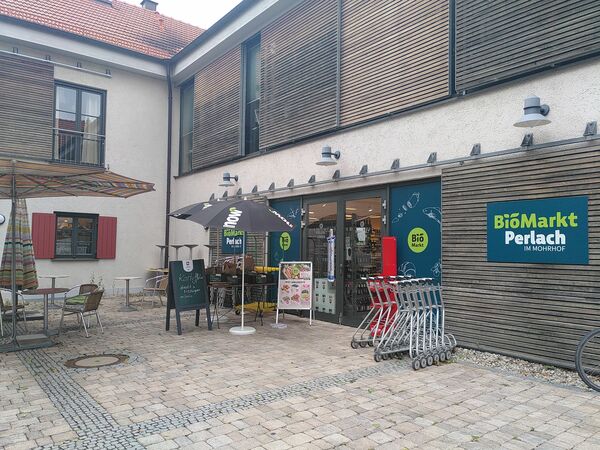
When traditional Grüner Markt chain closed down end of September 2014, their main house in the Altperlach neighbourhood made an exception. Housed in a vault it has a pleasant italophilic, somewhat venerable atmosphere, definitely worth a visit. The perfect surroundings when shopping for delicatessen, and a must-go during the Christmas season. It's now dubbed Mohrhof Perlach.
The other big independent is Schmatz ("smack") in the Glockenbach neighbourhood. Step by if only for the lovely decoration of their bodycare section. Kids are invited to play in an old-fashioned corner shop, and selected items are lovingly set on display. It's the only organic supermarket playing music in the background. By the end of 2018 they issued a ban on fresh herbs in plastics packing, and in 2022 there's a dedicated unpackaged shelf with dry food in deposit glasses.
For the picturesque yet upmarket farmshop feeling in the city aim for Stemmerhof on top of the Sendlinger Berg. Once upon a time a wealthy village farm opposite the village church the nicely restored houses are now the home of an organic supermarket and a range of small owner-run shops. The supermarket's butcher's cum delicatessen disk will happily sell lunch snacks to eat on the spot or to take-away. The same enterprise also runs a second branch in the suburb of Grünwald, just a street crossing opposite of Alter Wirt hotel and restaurant.
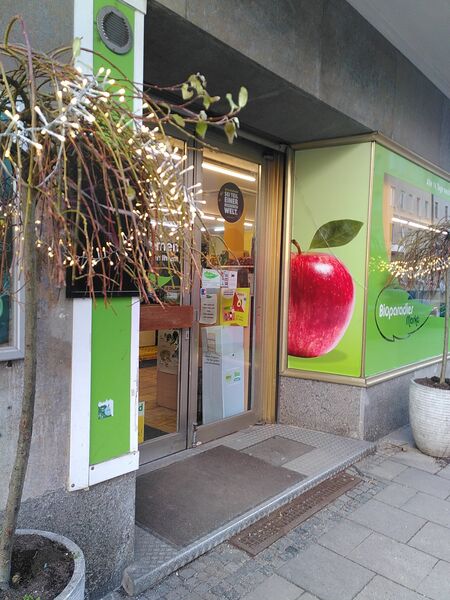
In the posh Lehel neighbourhood near the Eisbach river within the Englischer Garten park you'll find an independent organic supermarket with a touch of a spice and greens bazaar, the Bioparadies Biomarkt. Its friendly staff was even willing to open after closing time, to sell me a left-over bread on a Saturday afternoon. The serviced bakery and cheese counter is also the place to refill your spice jars with loose-weight herbs and spices. The supermarket is conveniently located opposite the tram stop "Paradiesstraße".
The former Erdgarten supermarket a ten-minutes walk away from Pasing train station (or two minutes from Pasing Marienplatz square) reopened as a branch of the local Vollcorner chain September, 2019 and continues to serve organic and vegetarian wholefood lunch as well as coffee and cake. They also have a nicely decorated bodycare section. Whether they'll continue to serve knitters with a fine selection of organic wool I am not aware of.
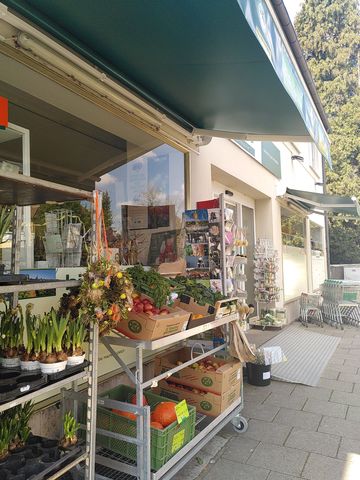
If you by chance happen to strand near the Klinikum Harlaching hospital, don't dispair: two tramstops in North-Eastern direction on the left side (just follow the tram line along Grünwalder Str.) you'll find Biowelt, a crammed independent organic supermarket with a superb selection of both, bodycare and frozen convenience products: All you need if visiting a friend or relative in the hospital in urgent need of a proper meal. Starting with lunch time they offer a helping of organic soup and a small selection of snacks. You may ask for a sandwich made on the spot. The shop also has a zero waste corner with dispensers for legumes and a small selection of other dry food as well as an assortment of dried fruit. Make sure to step by check-out to weigh your containers before you fill them.
Attending a conference at one of the huge Bogenhausen hotels near Effnerplatz? Your lunch break should be sufficient to follow Bülowstraße in Western direction to Herkomerplatz. Here you'll find not only a Herrmannsdorfer butcher's shop cum grocery cum eatery and the Hofpfisterei bakery branch next to it, but also a pleasant family-owned organic supermarket dubbed Biovolet. The Riemensberger family placed some bar tables in the entrance area to have a snack, and there is a second branch in Eching (formerly a Grüner Markt branch). Pay with your EC (VPay) debit card, and they donate a few cent to the BioBoden co-operative which buys farm land in order to lease it to organic farmers. On Thursdays you will receive a 10 percent discount if your shopping cart is worth more than 50 euros.
In the neighbourhood of Schwabing one of the oldest organic groceries in town is located, these days rather boringly dubbed Echt Bio Markt which is the brand of a network of small-scale independent organic supermarkets. The pleasant, traditional shop in Tengstraße offers refill for organic household detergents.
However. not all supermarkets of this brand have been long established: The independent owner-run Echt Bio Markt in Nymphenburg was opened during the lock-down of the covid-19 pandemic: As its name suggests
Bio am Romanplatz is the perfect place
to shop for provisions at the tram hub at Romanplatz.
There's only one Sunday-open organic supermarket in Munich, the Biokultur in the basement of the main train station. It's sister branch in the newly developed neighbourhood of Riem on the plot of the former Munich airport can be found inside the
Riem Arcaden shopping mall, sporting the only organic cafe in the neighbourhood. Unfortunately neither the cafe nor the supermarket are open on Sundays or public holidays.
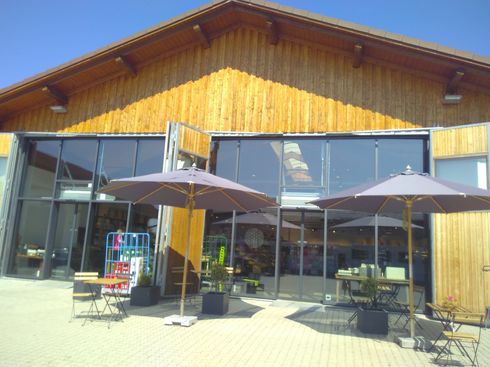
If you happen to take the S7 urban train in southern direction to the municipality of Höhenkirchen-Siegertsbrunn take the time to visit Roberts Bio-Genussmarkt on the premises of a former farmyard. The spacious, pleasantly refurbished and nicely decorated barn with its dark wooden shelfs makes it easy to spend some time on a coffee and cake in the included cafe area. When the weather is nice sun-shaded outdoor seating is provided. The former village of Höhenkirchen is part of the Mangfall bicycle route from Munich to Rosenheim, and this is a pleasant place for a break.
Waste-free supermarkets
By 2016 the first wrapping free supermarket made it into town: Check the zero-waste post for reviews.
Co-operatives with membership schemes
In the 1970ies and 1980ies many organic neighbourhood shops in Western Germany were co-operatively organised and sold to members only. In the 1990ies most of the surviving shops like the "Abakus" in Bremen opened to the general public, with discount schemes for members. To my knowledge, there's no such surviving shop in Munich, but recently established co-operatives such as "Deine Alternative" in Zorneding continue this inclusive approach.
As community supported agriculture (CSA) has an increasing appeal to city dwellers (the biggest one in Munich is the Kartoffelkombinat), the concept of an organic supermarket for members only came back to town in 2016, with
the Ökoesel ("eco donkey"), by now a small, yet full-fledged organic supermarket
in Nymphenburg near Leonrodplatz, focussing on
package-free food.
When the founders of Munich's oldest organic
supermarket, Lebascha in Haidhausen,
were to pass over the shop to a younger generation in summer 2022, the Ökoesel folks stepped in. Although both branches focus on a membership scheme, they are neighbourhood groceries open to everyone. As a non-member you'll simply pay non-subsidised (i.e. higher) prices.
In
summer 2021, another approach followed with the establishment of the Foodhub co-operative in Giesing, next to the lovely cafe "Shotgun Sister" and an organic bakery shop.
If you live in the vicinity you may consider joining this special organic food co-op which runs on the principle of solidarity: every member works three hours per month for or in the project and what's sold in the supermarket (predominantly regional produce) is decided democratically by its members. The shop concentrates on pre-packaged food, household and toiletry items, with the exception of loose weight fruits and veges, a small number of dry food gravity bins offering grains and nuts, and the self-service bread and rolls section. The household cleaning and bodycare shelves are filled with products in environmentally friendly packaging and focus on re-use (like the bamboo paper kitchen paper which can be washed and thus used several times) or little packaging through bigger volumes. There are plans for a zero-waste station to refill cleaning agents.
When I visited the shop at their open day in autumn 2021 I was surprised to not find a serviced fresh food counter given the fact that Karl Schweisfurt of Herrmannsdorfer Landwerkstätten is one of the three legal heads of the co-operative, most likely due to the fact that such a counter needs to be staffed.
No membership fee is required for becoming a member of the on-line market platform Marktschwärmer.
There's a
Marktschwärmerei pick-up hub in the neighbourhood of Milbertshofen. If you decide to join, you can order food, beverages, sweets and more from predominantly organic producers in and around Munich.
Formerly organic supermarkets
As part of the "teGut" chain the following, former "Basic" supermarkets still offer a reduced assortment of organic products:
- teGut Bogenhausen, Richard-Strauss-Str. 48, Mon–Sat 8–20 (as of summer 2024 still with organic butchers' and bakers' counter)
- teGut Neuhausen, Nymphenburger Str. 82, Mon–Sat 8–20
- teGut Laim, Agnes-Bernauer-Str. 73, Mon–Sat 8–20
- teGut Altstadt, Müllerstr. 45, Mon–Sat 7–20
- teGut Neuperlach, Thomas-Dehler-Str. 45, Mon–Sat 7–20
- teGut Ludwigsvorstadt, Luitpoldstr. 3, Mon–Sat 7–20
- teGut Schwabing, Belgradstr. 59, Mon–Sat 7–20
- teGut Victoriaviertel, Rheinstr. 1, Mon–Sat 8–20
Closed down
The following organic supermarkets do no longer exist although you will still find references to them on the web:
- Alnatura Innenstadt, Sonnenstr. 23
- Alnatura Aschheim, Theodor-Fontane-Str. 10, Aschheim
- Biochicco, Ohlmüllerstr. 19 corner Zeppelinstr.
- Biomarkt CM, Schlüsselbergstr. 13 (Berg am Laim)
- Denns w/in Hofstatt mall, Sendlinger Str. 12a, basement (city centre)
- Die Bio-Bäuerin, Peter-Wolfram-Str. 31 (Gronsdorf)
- Entenbach Naturkost,
Schlotthauerstr. 16
- Johannisgarten Naturkost, Johannisplatz 21 (Haidhausen)
- Gut zum Leben, Motorama Ladenstadt, Rosenheimer Str. 30-32 (Haidhausen)
- Tagwerk-Bioladen Hofgut Riem, Isarlandstr. 1 (Riem)
- Marktschwärmerei Werksviertel, c/o Cafe Guatemuc, Atelierstr. 1
- Nicos Naturkost, Kazmairstr. 38
- Veganz, Baldestr. 21 corner Auenstr., including self-service cafe Goodies
- Radix, Thalkirchner Str. 88 (Isarvorstadt)
- Vollcorner Ludwigsvorstadt, Lindwurmstr. 80
2024-06-01 14:00:00
[Munich, Au, Bogenhausen, Haidhausen, Harlaching, Lehel, Maxvorstadt, Nymphenburg, Schwabing, Pasing, Aschheim, Hoehenkirchen-Siegertsbrunn, Englischer_Garten, Mangfallradweg, Mangfall_cycle_route, organic, supermarkets, grocery, lunch, snacks, deli, Italian, CSA]
[direct link · table of contents]

Traditional corner stores in general have been almost extinguished from the streets of Munich, surviving mainly in the form of immigrant grocery stores which unfortunately rarely stock organic items. However, there are a few survivers from the time when organic was an unknown word in supermarket chains: small supermarkets equipped with wooden shelves and as crammed to the brim as possible for orderly German souls. Usually they have everything you need for your daily life, just give you fewer choice between brands and varieties. Sometimes you'll find delicatessen the big players don't stock, and fresh produce is as fresh as from their competitors. Prices may be a few cents higher than the cheapest option in one of the retail chains, but you will be surprised to learn that many products actually are less expensive in a corner shop. In addition you may have a chat with the shop assistants, sometimes the owners themselves, and usually will be given a competent answer to questions you may have. Many of these shops have some tables and chairs where you can have a coffee, snack or vegetarian lunch.
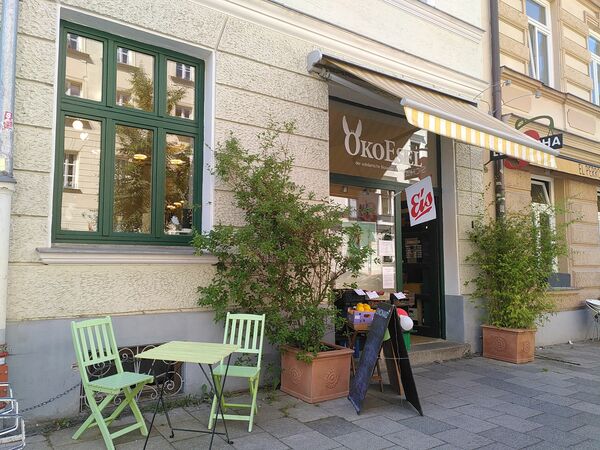
Groceries
The (to my knowledge) oldest full retail organic neighbourhood shop in town, theLebascha in Haidhausen, was run collectively by a bunch of friendly women until they retired. The shop would have been lost for the neighbourhood if not the distributor had been tieing up strings with the community supported co-operative Ökoesel ("eco donkey" is derived from a pet name for bicycles – "Drahtesel" – as they started up as a bicycle delivery service) in Neuhausen. Since 9th of July, 2022 the base line of the shop has been financed by membership fees (depending on self-assessment), but Lebascha continues to be open for everyone: None-members simply pay (a usually low) market-price, members are entitled to discounts (usually between 12 and 20 percent). With its (conventional) liquorice shop-in-shop (to my knowledge offering the largest selection liquorice in town) the Lebascha also is a hot tip for aficionados. An assortment of loose-weight herbs and spices, and a basic range of loose-weight cereals, nuts, legumes and grains, detergents and soap make the Lebascha the only surviving zero-waste shop near Ostbahnhof. Note that it is closed on Wednesdays and does not accept cards, but members may chalk up and pay later.
A few corners away from tube stop Implerstraße in Sendling the neighbourhood grocery Hollerbusch ("elderbush") offers
vegan and vegetarian lunch as well as yoga, pilates or singing lessons in a backroom.
The shop is also a delivery hub for the Munich based community supported agriculture project Kartoffelkombinat and offers gravity bins to refill dry food and reduce package waste.
Immigrant shops and traditional corner stores
While these small supermarkets cater for all daily necessities including fresh fruits and veges there's no such thing as an all-organic immigrant grocery focussing on the latter and supplementing with a selection of dry goods and delicatessen from their owner's place of birth. The nearest you come is Giesinger Fruchtmarkt near tube-stop Kolumbusplatz. As about three quarters of the fruits and veges as well as most of the Italian delicatessen are conventional you have to carefully watch out for the bio keyword. Apart from organic greens they also offer organic choices for olive oil, wine, pasta and cheese.
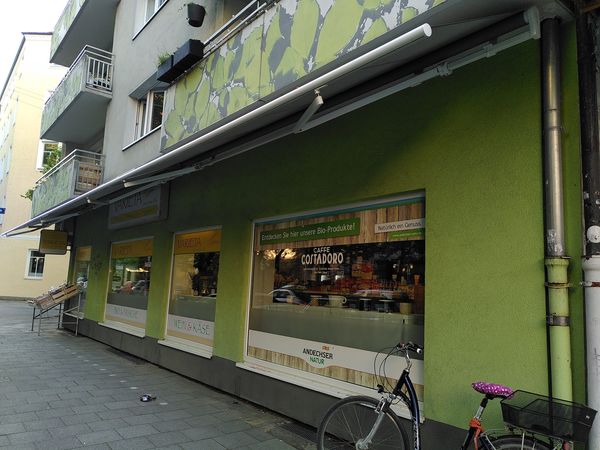
A similar owner-run mini market, Varieta am Körner Eck, is located in the Glockenbach neighbourhood, on Auenstraße between the Reichenbach and the Cornelius bridges. The bakery items are all organic, and organic products in the self-service area are clearly marked "bio" on the shelf. The shop offers a lot of directly imported Italian dry food, but unfortunately none of it in organic quality. Also most of the fresh fruits and veges are conventionally produced.
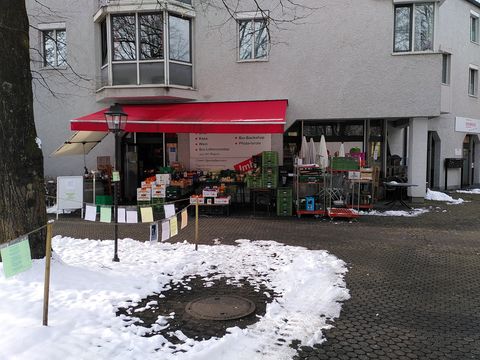
Remember the tales of parents or grandparents about the corner shop they went to as children to buy a single sweet which the shop keeper would put down on a list for their parents to pay later on when they came to shop bread, milk, veges and all the ingredients for the home-cooked meal? The spirit of these shops from the past you may find left in some immigrant shops and this is the reason why I list the Viktualieneck in Bogenhausen in this section. I learned about this crammed greengrocer's shop opposing the newly build neighbourhood of Prinz-Eugen-Park on my quest for shops supporting package-free shopping, but when I went there it turned out a likeable traditional supermarket offering
fresh fruits and veges, regional delicatessen, bread and rolls, wine and all kinds of food. About half of it is organic, namely all the bakery products and certainly more than half of the pre-packaged food. Most of the fresh fruits and veges come from a conventional local market garden
– the turnaround for organic greens wasn't good enough among his customers, and his emphasis was on avoiding waste the shop keeper told me. Package-free shopping is possible for all fruits and veges as well as all items from the bakery, meat and cheese counter.
I cannot tell you whether the shop chalks up for trustworthy customers, but if you are in the vicinity support this shop instead of the supermarket chains nearby.
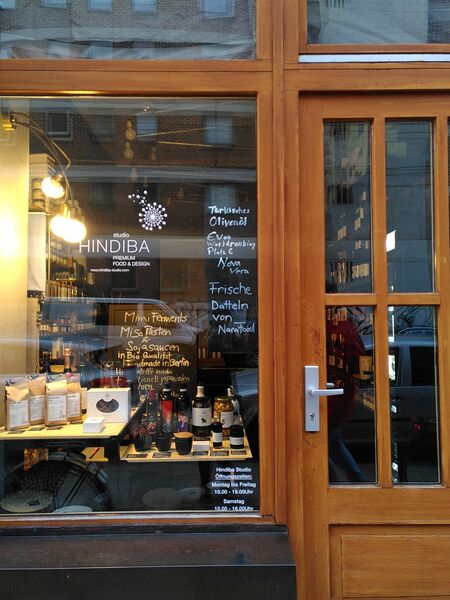
Delicatessen
The upmarket contrast to these somewhat shabby grocery stores is naturally to be found in the posh neighbourhood of the Lehel:
Studio Hindiba offers oils, herbs and condiments, olives, all types of rice, the famed ferments of Berlin's Markus Shimizu, a carefully selected range of wines and other predominantly organic delicatessen. For the smaller purse it may be just a beautyful shop to marvel at, but if your budget isn't painfully tight it's the perfect place to shop a foodie gift for someone special.
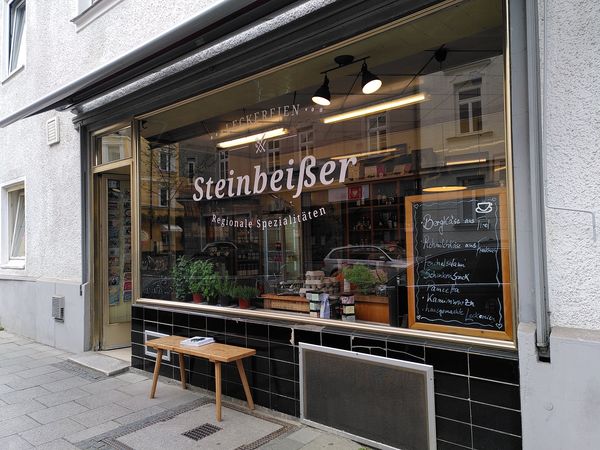
A few steps from Wiener Platz you'll find Steinbeißer, a cosy owner-driven deli advertising 'regional specialities'. Take this with a grain of salt – the organic Italian olive oil and Scandinavian candies (not organic) are small-scale produce specific to their region of origin, but certainly not from the greater Munich area. Most meat products come from small-scale Austrian farms which are likely to produce according to near-organic principles. Certified organic products unfortunately do not dominate the pleasantly arranged tables and shelves with artisanal products – predominantly foodstuffs and wine, but you may ask the owner about the provenance of his fare.
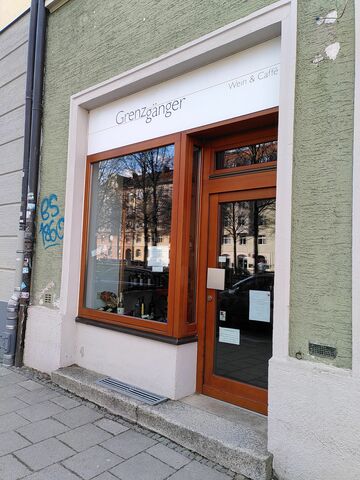
Wine, pepper and coffee from carefully selected small-scale producers, that's the focus of Grenzgänger ("border crosser"), a lovely shop directly located at the beautiful Bordeaux-Platz in Haidhausen, just opposite Café Reichshof. When you come here during the cold season you may find yourself welcomed by the warmth of a fireplace, and you can get a speciality coffee (14 types of Arabica to choose from) into your own mug. During covid-19 restrictions cream-ware cups aren't provided, so if you come without a mug you will be charged an extra 20 cent for a plastics-free one-way cup.
Unfortunately most of the products aren't certified organic, with the notable exception of the Demeter-certified honey and bee wax candles of a local beekeeper who is working in accordance with biodynamic principles, i.e. the gold standard for animal welfare.
Specializing in cheese and supplements – wine, olives, oil, herbs, condiments, to name a few – the Luigino's booth in the Southern part of Viktualienmarkt, opposite the crossing of Reichenbachstraße and Blumenstraße is the perfect place to shop for a picnic or the no-frills romantic candle light dinner. Once an almost entirely organic cheese booth the percentage of organic products on sale has diminished during the past years: mainly due to the advent of artisanal, yet conventional Italian cured meats, partially due to a lesser focus on organic labels on the selection of cheeses.
When ordering an Italian-style sandwich to take away you may wish to enquire about the ingredients and probably stick to the vegetarian ones since the Italian cured meat products usually are not organic.
The owner once run a delicatessen in Maxvorstand which was replaced by an organic ice-cream parlour in 2018.
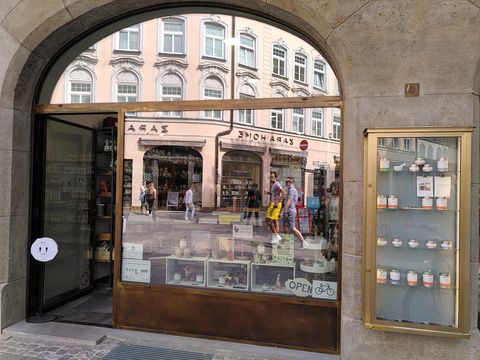
Herbs and spices
Not exactly a spice bazaar, but a pleasant spice and herbs shop Gewürze der Welt ("spices of the world") had a long tradition on its former location in Thiereckstraße in the very city centre, but when the historic Ruffini house re-opened after a two-year period of restoration work in 2020, the shop moved back to its roots in the Sendlinger Straße (now) pedestrian area. As the name suggests you will find a world of spices, herbs, blends and condiments, a notable part of them in organic quality.
Munich's first organically certified herbalist is tucked away in a non-descript side road near Sendlinger-Tor-Platz, just a few steps aside the remnants of the Glockenbach neighbourhood's famous queer bars. Light and friendly the
Kräutergarten offers all kinds of organic dried herbs, spices, natural cosmetics and the like.
Sonnentor, the leading Austrian producer of organic herbs and spices, has a shop in Munich, too: Located in the basement of
Stachus-Passagen, a generally boring shopping mall a level above this central urban train and tube station, it's probably not the shop that you'll find by accident while taking a stroll through the city. Apart from herbs, spices and condiments they also have a selection of natural body care – an easy place to shop for a nice last-minute give-away.
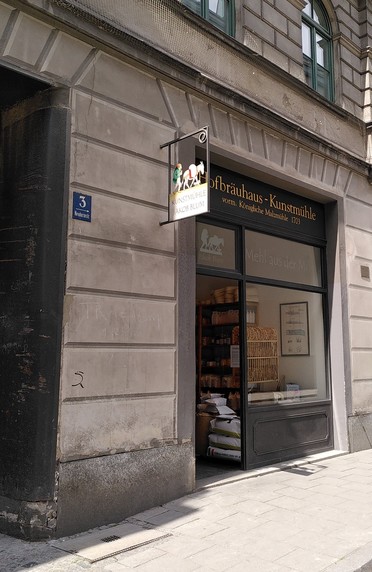
Special shops
The only operating corn mill in Munich with its cosy mill shop is located in a small street a few steps from the tourist hotspots of Marienplatz and Hofbräuhaus. The Hofbräuhaus-Kunstmühle offers all types of flour, bruised grains, semolina, bran and cereals, predominantly of corn grown in the region. An increasing number of these artisanal products are organic, so watch out for the 'bio' keyword on the classic paper bags or the listings of the web shop. These products are also the base ingredients for the artisanal home bakery E. Knapp & R. Wenig next door where you can buy hand-made bread and rolls based on traditional, predominantly Munich recipes. The mill shop also stocks a selection of organic dried fruit, olive oil, raising agents and other baking ingredients as well as dry breads like South-Tyrolean Schüttelbrot.
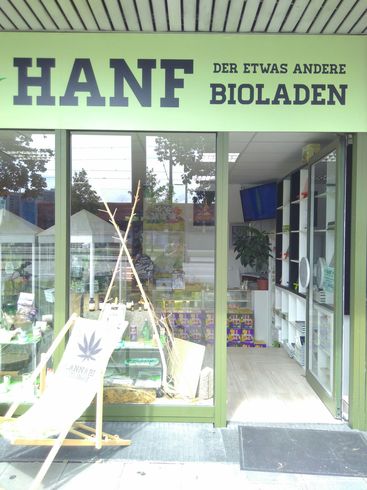
Another very special mono-themed shop, Hanf – der etwas andere Bioladen, sells everything containing THC-free hemp: beer, lemonades, cookies, bars, tea, ice-cream, chocolates, body care, clothes, liquids, pet food and more. Although the name suggests it not all products are certified organic, especially not in the non-food range, but the sheer number of goods based on this versatile plant is quite impressive. The main shop (which is closed on Mondays) isn't located in the most inviting part of town but can easily be reached from Leuchtenbergring urban train stop. But wait: in 2019 a second one opened at a tourist-friendly location between Isartor and Marienplatz.
Ceased to exist
The following places shut down and were replaced by other, not organic ones. So don't be confused when you find references to them on the web:
2024-06-01 10:45:00
[Munich, Haidhausen, Schwabing, Lehel, Maxvorstadt, organic, lunch, snacks, coffee, supermarkets, deli, grocery, Italian, vegan, hemp, flour, mills, fashion, bodycare, spices, herbs, delicatessen, eatery, zero_waste, unverpackt]
[direct link · table of contents]




























